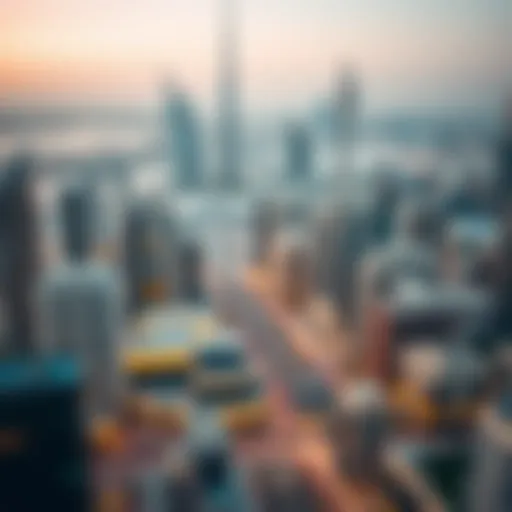Ramadan 2024 Timing Insights for Dubai Residents
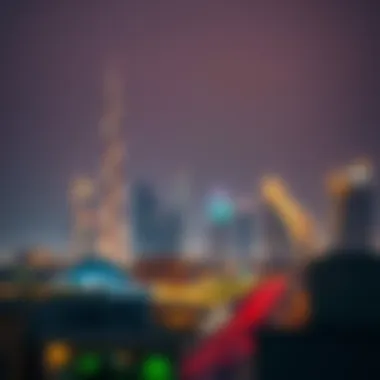

Intro
Ramadan is not just any month on the calendar; it holds a treasure-trove of meaning for millions around the globe, particularly in cities as vibrant as Dubai. As we approach the year 2024, understanding the timing and implications of this holy month can significantly enhance both the religious and cultural experiences for residents and visitors alike. This article takes a closer look at Ramadan in Dubai, highlighting not only when it will occur but also its ramifications on daily life, including work schedules and the broader real estate market.
For many, Ramadan is a period of fasting, prayer, and reflection, with significant cultural rituals accompanying its observance. In Dubai, where a diverse population thrives and economic activities resonate with the festive spirit, the experience of Ramadan is uniquely multifaceted. The month plays a crucial role in shaping the rhythm of daily life in the city—from the early morning suhoor (pre-dawn meal) to the evening iftar (meal to break the fast) gatherings.
Thus, as we dive into the specifics of Ramadan's timing in 2024, we highlight its importance, offering insights not just into spiritual practices but also practical tips that can aid those navigating Dubai during this special time. From its potential impact on local businesses to adjustments in real estate dynamics, understanding Ramadan in all its complexity allows for a deeper connection to the zeitgeist of Dubai.
Prelude to Ramadan
Ramadan stands as a pivotal month for Muslims across the globe, enveloping millions in a blanket of spirituality, discipline, and communal ties. It is not merely a time of fasting, but a period that fosters self-reflection and deeper understanding of one's faith. For residents and visitors in Dubai, comprehending this sacred month in 2024 becomes vital, not only to align with cultural practices but also to navigate the unique dynamics that arise in a city known for its melting pot of traditions.
Understanding the significance of Ramadan requires delving into both its religious roots and contemporary relevance in urban settings. This article specifically aims to highlight key aspects such as the timing of prayers, dates for fasting, and how these elements shape daily life in Dubai.
The Religious Importance of Ramadan
At the heart of Ramadan lies its profound spiritual significance, rooted in the Quran. It is during this month that Muslims believe the Quran was revealed. Hence, fasting becomes an act of devotion—an opportunity to connect with God and reflect on one's life and actions. The fast, observed from dawn till dusk, aims to cultivate empathy for the less fortunate while serving as a reminder of the blessings often taken for granted.
"Fasting is not just abstaining from food and drink; it is an exercise in self-restraint and mindfulness."
In Dubai, the observance of Ramadan influences not only personal practices but also communal activities as mosques teem with worshippers who gather for prayers and Quranic recitations. The city transforms into a sanctuary of faith, with enhanced religious events that bridge cultural divides.
Cultural Practices During Ramadan
Culturally, Ramadan in Dubai is vibrant and teeming with unique practices that reflect the local customs intertwined with broader Islamic traditions. Families often come together to break their fast during Iftar, a meal characterized by shared dishes and warm conversations. Traditional foods like dates and Arabic coffee usually kick off these gatherings, emphasizing hospitality—an integral part of Emirati culture.
Moreover, the month is marked by an array of events like food drives, charity initiatives, and community Iftars that foster bonds among residents, enhancing the already strong sense of community.
Cultural observances are not limited to the food, however. Throughout the month, the streets of Dubai are alive with illumination, as lanterns and decorations adorn homes and public places. It creates an ambiance that is both festive and reverent.
In short, Ramadan acts as a lens through which one can appreciate the confluence of faith, culture, and community, distinctively setting the stage for personal connections as well as opportunities for deeper engagement with the practices and beliefs that define this important period.
Ramadan in 2024: Key Dates
Understanding the key dates in Ramadan 2024 is essential for those living in or visiting Dubai during this significant period. The timing of Ramadan affects everything from daily routines to real estate investments. By grasping the timing nuances and cultural undertones of this holy month, participants can engage more meaningfully with the local community and optimize their activities accordingly.
Start Date and Significance
The expected start date of Ramadan in 2024 is on the evening of March 10, although the precise timing may vary depending on moon sightings. This month is not merely a calendar event; it represents a profound spiritual journey for Muslims. The first sight of the crescent moon signals the onset of month-long fasting, prayer, reflection, and community bonding.
During Ramadan, from dawn to sunset, observant Muslims abstain from food, drink, and other physical needs. The essence of fasting is to cultivate empathy for the less fortunate, build self-discipline, and strengthen one's connection with God. Importantly, families gather for Suhoor, the pre-dawn meal, setting the tone for the day ahead. Community events, prayer at mosques, and charitable work peak during this time, reflecting the communal spirit of the month.
Key Points about the Start Date:
- Cultural Preparations: As the start date approaches, there's a palpable buzz in Dubai. Markets are stocked with special foods and decorations.
- Economic Activity: Retail sectors, especially food and beverage businesses, experience spikes in activity leading up to Ramadan. Many investors observe these trends closely.
- Local Fasting Laws: Non-Muslims are expected to be mindful of fasting rules during the day, including refraining from eating in public places.
End Date: Eid al-Fitr
Ramadan concludes with Eid al-Fitr, expected to be celebrated on April 9, 2024. This day marks a festive occasion that culminates the spiritual discipline of the month. The significance of Eid al-Fitr goes beyond simply breaking the fast; it also involves gratitude and celebration within the community.
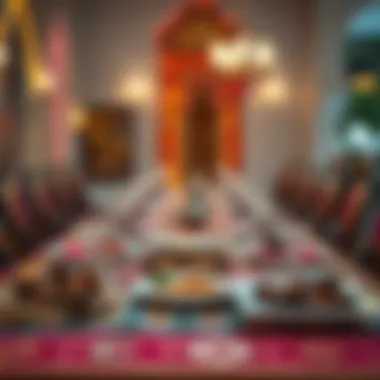

Muslims engage in prayer, often at large open spaces to accommodate the crowds. Following the prayers, it is typical for families to share festive meals, exchange gifts, and provide alms to the needy. Eid al-Fitr encapsulates a sense of community and togetherness, where bonds are strengthened through shared meals and giving.
Points to Consider for Eid:
- Holiday Preparations: The days leading to Eid often see increased activity in retail, as people purchase gifts, clothing, and food.
- Real Estate Consideration: Many investors look into family-friendly properties at this time since families often seek to gather for celebrations.
- Visitor Engagement: Non-Muslim visitors can enjoy engaging experiences during the festival, such as local communities inviting them to join in celebrations, showcasing the rich tapestry of culture in Dubai.
Remember: Ramadan is more than just dates on a calendar; it embodies shared experiences and transformations in daily life.
Aligning activities with these key dates in Ramadan not only respects local customs but also enhances one's overall experience during this culturally rich season.
Timing of Suhoor and Iftar in Dubai
The rhythm of daily life transforms during Ramadan, particularly for those observing the fast. Understanding the timing of Suhoor and Iftar is pivotal, as it directs the actions of individuals and families throughout the month. Suhoor refers to the pre-dawn meal consumed before the fast begins, while Iftar is the meal that breaks the fast at sunset. These timings dictate when one can eat and drink, making them central to the overall experience and observance of Ramadan.
Calculation of Suhoor and Iftar Times
Calculating the precise times for Suhoor and Iftar in Dubai involves specific solar references. These times shift daily and vary by location. Generally, Suhoor must be consumed before the Fajr, the dawn prayer, while Iftar occurs right at the Maghrib, the evening prayer. In 2024, as the month progresses, one can expect the times to change slightly each day, influenced by both the lunar calendar and geographical position. Residents often rely on resources like local mosques, community apps, or the Dubai Islamic Affairs and Charitable Activities Department’s official guidelines to stay informed.
Some useful links to track 2024 timings include:
Local Variations in Timing
Local variations can alter Suhoor and Iftar timings slightly from one neighborhood to another within Dubai. Factors influencing this include nearby tall buildings that can cast shadows or the picturesque dunes that might alter light exposure. Often, the more urban areas like Downtown Dubai may see timings that differ by a minute or two compared to quieter suburbs such as Jumeirah or The Springs.
Moreover, expatriate communities may provide additional cultural flavors to the iftar experience. In neighborhoods where diverse nationalities gather, you might find unique fusion meals that incorporate local and international cuisines, reflecting the melting pot that Dubai is known for.
Ultimately, understanding these local nuances allows not just for adherence to the fast but enhances the communal experience of Ramadan, fostering connection and solidarity. Listen closely, as chatter fills the air when families and friends gather around their tables, eagerly awaiting that call to prayer which announces the end of the day's fast.
"In Dubai, the sound of the call to prayer becomes a pivotal moment, marking the transition from restraint to celebration, as the fast is broken and communities come together."
Being aware of these temporal specifics provides deeper insights into not only the religious observances but also into the social structure that Ramadan nurtures in Dubai.
Impact on Daily Life
Ramadan brings about changes that ripple through various aspects of life in Dubai. As much as it is a time of reflection and prayer, it significantly shapes the daily routines and interpersonal dynamics of both residents and visitors. Understanding these impacts is crucial for anyone looking to navigate the unique atmosphere this holy month creates.
Changes in Work Hours
One of the first notable adjustments during Ramadan is the alteration of work hours for businesses and government offices. Typically, the working day is shortened to accommodate fasting schedules. Many organizations may operate on reduced hours—often from about 9 AM to 3 PM, in contrast to the usual 8 AM to 5 PM. These shifts are vital not only for those observing the fast but also for maintaining a balanced work-life dynamic during this spiritually significant period.
Employers in the real estate sector, for instance, need to stay agile and adjust their strategies accordingly. With shorter hours, arranging meetings or open houses requires careful timing, often scheduled around Iftar gatherings to ensure maximum attendance. Moreover, many firms encourage a more relaxed atmosphere, fostering understanding among colleagues regarding fatigue due to fasting.
"Flexibility is vital; it shows that you respect the cultural practices of your workforce while also supporting productivity."
Businesses that adapt to these changes usually fare better, as they keep their employees motivated and engaged.
Adjustments in Social Activities
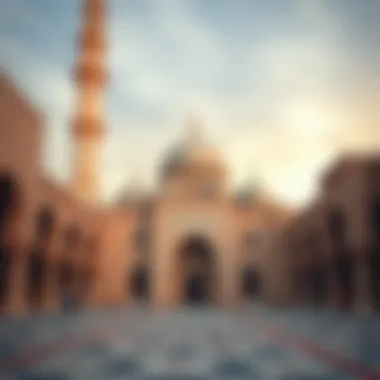

Social life also undergoes a transformation throughout Ramadan. Activities that would normally take place at all hours areoften shifted to the evening, post-Iftar. Family and friends gather to break their fast together, leading to restaurants and homes bustling with energy and festive spirit. For those observing the fast, evening meals become a highlight, filled with traditional foods and long conversations that foster community bonds.
Consequently, social calendars fill up quickly, with an uptick in invitations for Iftar gatherings. It is common to find large communal celebrations, where people come together irrespective of their backgrounds, promoting a spirit of unity and togetherness. Furthermore, if you're planning to socialize during this month, it may be beneficial to familiarize yourself with local customs surrounding hospitality and generosity.
Besides the personal aspect, charities often host events during Ramadan to support needy families. Participation in these charitable activities is a wonderful way to engage with the community while also giving back.
In summary, the adjustments brought on during Ramadan impact work hours and social activities significantly, leading to a unique rhythm that characterizes daily life in Dubai during this sacred month. Navigating these changes with respect and understanding can lead to a more enriching experience—both for individuals and the broader community.
Real Estate Insights During Ramadan
Ramadan is not just a religious observance; it also has a major impact on Dubai's real estate market. Understanding this influence is crucial for homebuyers, investors, and real estate agents alike, as it can shape decisions on property transactions and investments during this significant period.
Market Trends During Ramadan
During Ramadan, there tends to be a noticeable shift in market dynamics. Transactions often slow down initially as many people focus on spiritual obligations and community activities. However, as the month progresses, there is usually an uptick in interest and activity.
Key aspects to consider include:
- Price Adjustments: It's common to see property prices either stabilize or drop slightly as demand fluctuates.
- Increased Viewings: As Ramadan nears completion, potential buyers often rush to finalize their purchases before Eid al-Fitr, which can lead to a spike in viewership and sales.
- Seasonal Promotions: Real estate developers may create attractive packages and incentives to encourage sales during this period, drawing in prospective clients who are motivated by pre-Eid festivities.
"The behavior of buyers during Ramadan can be unpredictable, often hinging on cultural and social factors beyond just the financial aspect."
Investment Opportunities
Ramadan presents unique investment opportunities that astute investors can take advantage of. When many are preoccupied with religious observance, savvy investors often find openings due to reduced competition.
Investing strategically in Ramadan can include:
- Commercial Properties: With many businesses looking to capitalize on the post-Ramadan rush, investing in commercial spaces, especially in areas with heavy foot traffic, can be lucrative.
- Short-term Rentals: Given the increase in tourism during Eid celebrations, properties in prime locations can yield high returns when rented out for short durations.
- Community Developments: Properties in residential communities that support communal gatherings and have amenities beneficial for families can see higher demand as people look for spaces accommodating the spirit of Ramadan.
Investors must maintain a pulse on local trends to make informed decisions that align with not just market rates, but also cultural sentiments and seasonal influences. The more you understand the interplay between Ramadan and real estate, the better positioned you'll be to capitalize on opportunities.
In summary, Ramadan in Dubai isn't merely a month of fasting and reflection; it represents a unique lens through which one can evaluate and navigate the dynamic real estate landscape. By recognizing seasonal trends and adapting investment strategies accordingly, stakeholders can not only preserve but potentially enhance their portfolios.
Visitor Considerations
Understanding the visitor experience during Ramadan in Dubai is essential for ensuring both a respectful and enjoyable trip. Ramadan is not just a month of fasting; it embodies a unique atmosphere that blends spiritual reflection with communal gatherings. This makes it crucial for tourists to be aware of certain customs and practices that are integral to this holy Month.
Cultural Etiquette for Tourists
When visiting Dubai during Ramadan, tourists should be sensitive to the cultural norms that shape the daily lives of local residents. One of the foremost considerations is the matter of eating and drinking publicly. The fast from dawn till sunset means that the local populace refrains from eating, drinking, or smoking in public. For visitors, this translates to a need for discretion. While it may feel uncomfortable, it is respectful to refrain from consuming food or liquids in public places, such as malls or streets. Tourists can certainly enjoy their meals inside cafes and hotels, but it’s best to avoid the visible consumption of food outdoors.
Moreover, clothing choices should reflect the significance of the holy month. Though Dubai is known for its cosmopolitan appeal, dressing modestly shows respect for local customs. Light and breathable clothes that cover shoulders and knees are advisable, making your visit amicable while remaining cool in the desert heat.
Another essential aspect is the timing of activities. Many local businesses will alter their hours, often opening later in the day and closing earlier. It’s beneficial for visitors to check in with local establishments regarding modified hours of operation. Engaging with the local community can provide enriching experiences during this time, so learning a few common Arabic greetings could make a positive impression.
Respecting Ramadan practices can lead to a more harmonious experience for everyone involved.
Dining Options During Ramadan
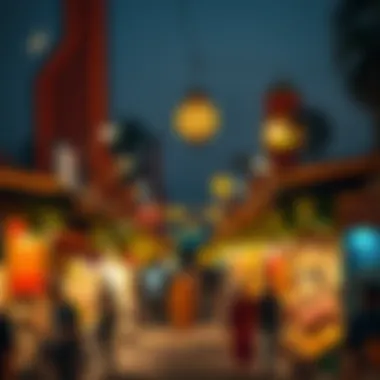

Dining during Ramadan presents a unique set of circumstances for visitors. Many restaurants offer special iftar menus to cater to the breaking of the fast, revealing an array of traditional dishes that one might not encounter outside of this period. A good place to start would be the iconic Al Fanar Restaurant, which introduces diners to Emirati cuisine, illustrating culinary traditions that have been passed down through generations.
In addition to traditional venues, many malls and hotels provide extensive iftar buffets. For instance, the Burj Al Arab and Atlantis, The Palm frequently host lavish iftar gatherings, where guests can enjoy a sumptuous variety of dishes. It is advisable to make reservations, considering the popularity and demand for these dining experiences approach their peak during Ramadan.
For those keen on experiencing both traditional and contemporary culinary delights, options like the Dubai Marina or Downtown Dubai offer a plethora of eateries that serve different cuisines, ensuring that there is something for everyone’s palate.
Furthermore, if non-Muslim visitors wish to get a taste of how local families gather at sunset, some hotels might offer 'iftar with local families' programs, presenting an intimate glimpse into the customs and traditions surrounding Ramadan.
In short, being mindful of the spiritual significance of Ramadan while also enjoying the culinary landscape of Dubai creates a richer experience.
As the holy month approaches, both tourists and locals can partake in the shared essence of community, reflection, and renewal. Understanding these visitor considerations paves the way for a truly memorable experience in Dubai during Ramadan.
Community Events and Activities
During Ramadan, community events and activities in Dubai take on a special significance. These happenings are not just fun; they are vital for strengthening bonds among residents, fostering a spirit of togetherness, and enriching the cultural fabric of the city. As families and friends gather to break their fast and celebrate, these occasions create an environment where tradition meets modernity. They also provide valuable opportunities for residents and visitors alike to engage with the local culture.
Ramadan Festivals and Gatherings
Ramadan festivals in Dubai are colorful spectacles that draw participation from all walks of life. Markets like the Ramadan Night Market spring to life, showcasing a tapestry of culinary delights, arts, and crafts. These events are the pulse of the city during this holy month. Each night is marked by the enticing aroma of food stalls offering everything from traditional dishes such as fattoush and harira to international cuisines that reflect Dubai's multiculturalism.
Benefits of Participating in Festivals:
- Cultural Immersion: Attendees gain insight into customs and traditions of Ramadan.
- Local Economy Boost: These events support local businesses, many of which offer unique, handmade goods.
- Social Interaction: It’s a chance for residents to meet people and make new connections.
Visitors are often encouraged to join in these festivals, blending into the vibrant atmosphere. Many families set aside time to explore the markets together, making it an integral part of their Ramadan experience. Special nights often feature live music, art showcases, and fun activities for children, creating lasting memories.
Charity Initiatives During Ramadan
Charity is a cornerstone of Ramadan, and Dubai takes this to heart. Many organizations ramp up their efforts during the holy month, organizing initiatives aimed at helping those in need. From food drives to fundraising events, the spirit of giving resonates deeply within the community. With various local charities and NGOs leading the charge, it's heartening to see many residents get involved.
"Ramadan is not just about fasting; it is a time to reflect on what we have and give back to those less fortunate."
Key Charity Initiatives Include:
- Food Distribution Drives: These programs ensure that families in need receive iftar meals.
- Eid Gift Packages: Donations help create packages for children from low-income families, fostering the spirit of Eid.
- Community Fundraisers: Events that pool resources for various local charities, promoting collective action for a greater cause.
The emphasis on charity during Ramadan not only impacts the recipients but also enriches the lives of donors, creating a fulfilling cycle of giving. In this way, participating in charitable activities embodies the very essence of Ramadan and strengthens community ties.
Closure
In wrapping up this exploration of Ramadan's timing in Dubai for 2024, it's essential to understand the multifaceted impact this holy month has on the fabric of the city. The significance goes beyond mere dates; it envelops a whole culture, embodying the values of patience, community, and spiritual reflection.
Reflections on Ramadan's Importance in Dubai
Ramadan in Dubai is not simply about fasting from dawn to dusk; it stands as a testament to the unity and resilience among its populace. Residents partake in rituals that bind them together, from community Iftar meals to charitable donations aimed at aiding those in need. The month serves as a crucial period for self-improvement and spiritual growth, imbuing life in this thriving city with a deeper meaning.
Additionally, the diverse community residing in Dubai, which includes myriad nationalities, comes together to respect and engage in Ramadan practices. Local businesses often offer special promotions, inviting everyone—even non-Muslims—to experience the enriching customs. This blend of traditions facilitates greater understanding and compassion among different cultural and religious groups, making it a truly unique aspect of life in Dubai.
"Ramadan represents a journey of self-discovery, nurturing respect and empathy, enhancing the cultural richness of Dubai."
Final Thoughts on Timing and Cultural Engagement
Understanding the specific timing of Ramadan—such as Suhoor and Iftar—is critical for both residents and visitors. This knowledge not only improves personal experiences but also fosters respect for local traditions. Recognizing the local prayer times allows one to navigate daily routines thoughtfully, adjusting schedules to participate in communal gatherings and festivities.
For investors and homebuyers, noting the timing of Ramadan might also influence market dynamics, as periods of increased social activities can boost the demand for real estate, particularly in commercial and hospitality sectors.
Ultimately, engaging with the cultural peculiarities of Ramadan not only enriches personal experience but also promotes a sense of belonging in a city that thrives on diversity. As we approach this holy month, it’s an opportune time to reflect on its significance and how it shapes both daily life and broader community interactions in Dubai.



